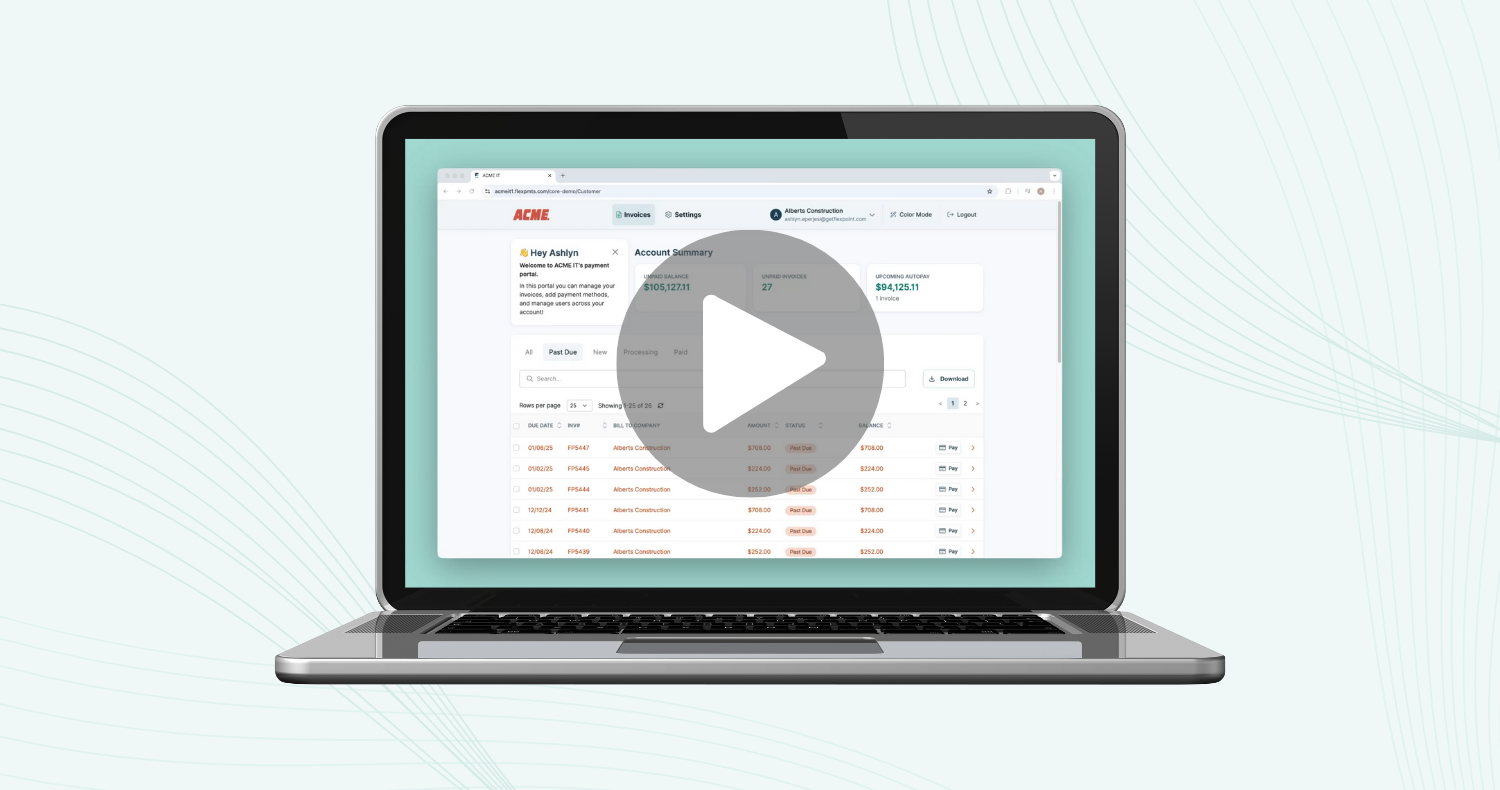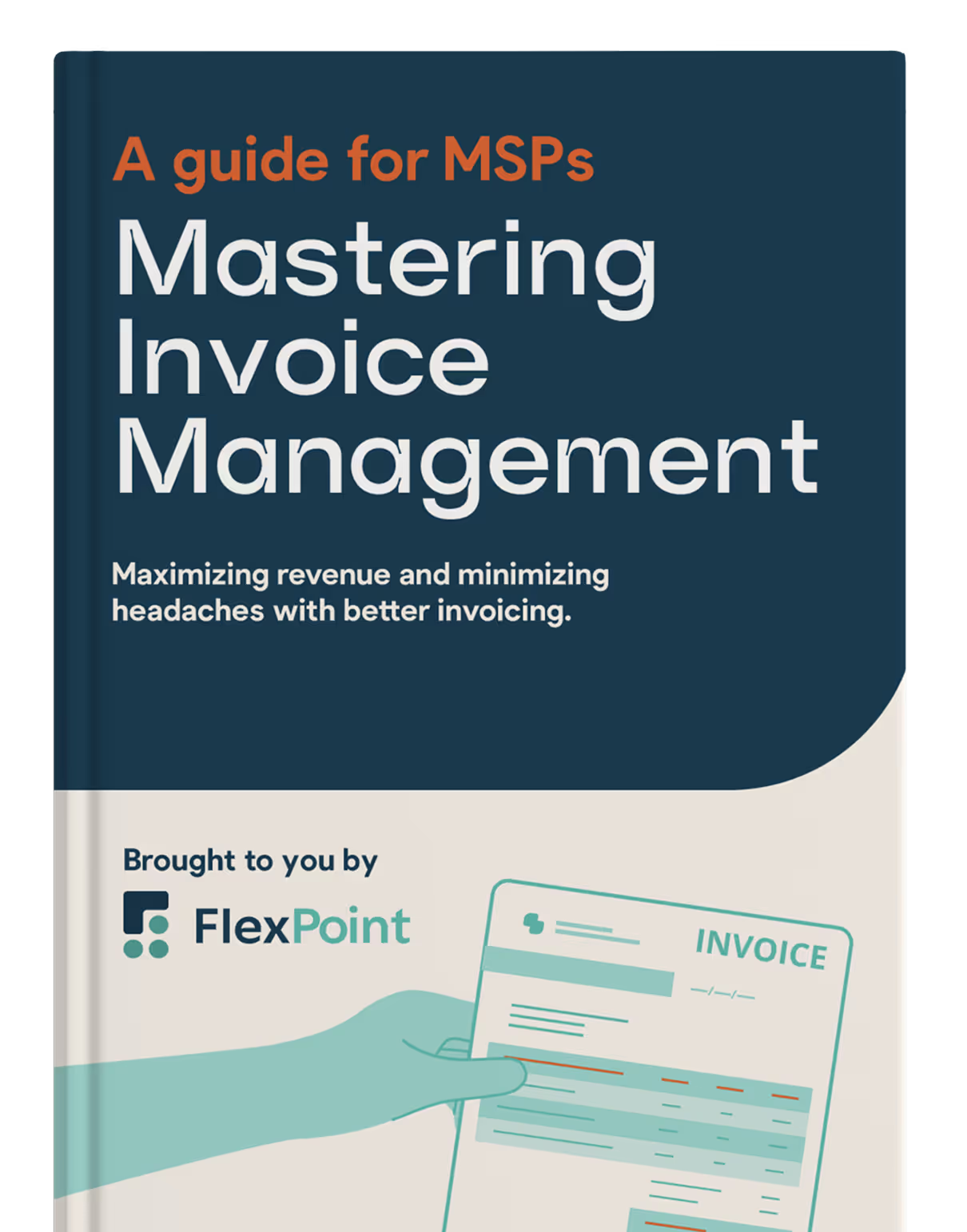How Proactive Billing Practices Transform MSP Financial Operations

Many MSPs face common billing challenges that can significantly impact their financial stability.
These include the pervasive issue of late payments, with reports indicating that 81% of MSPs experience payment delays. This can lead to substantial cash flow problems, a significant concern for many MSP owners.
Furthermore, MSPs can suffer from revenue leakage due to manual errors, missed billable items, and inefficient tracking.
Inconsistent invoicing cycles and a lack of clear payment terms can also contribute to these financial strains, creating administrative burdens and potential client dissatisfaction.
To address these hurdles and foster financial success, MSPs must embrace proactive invoicing and ensure timely and accurate billing processes.
Monitoring payment statuses and financial data in real time provides valuable insights for informed decision-making and improved cash flow management.
Ultimately, leveraging automation for payment optimization, including automated reminders and flexible payment options, can lead to faster and more convenient payments. This reduces administrative overhead and strengthens client relationships.
This article will guide you on adopting proactive billing strategies to significantly improve cash flow, minimize costly errors, and ultimately strengthen overall financial operations.
{{toc}}
The Importance of Proactive Billing Practices in MSP Financial Management
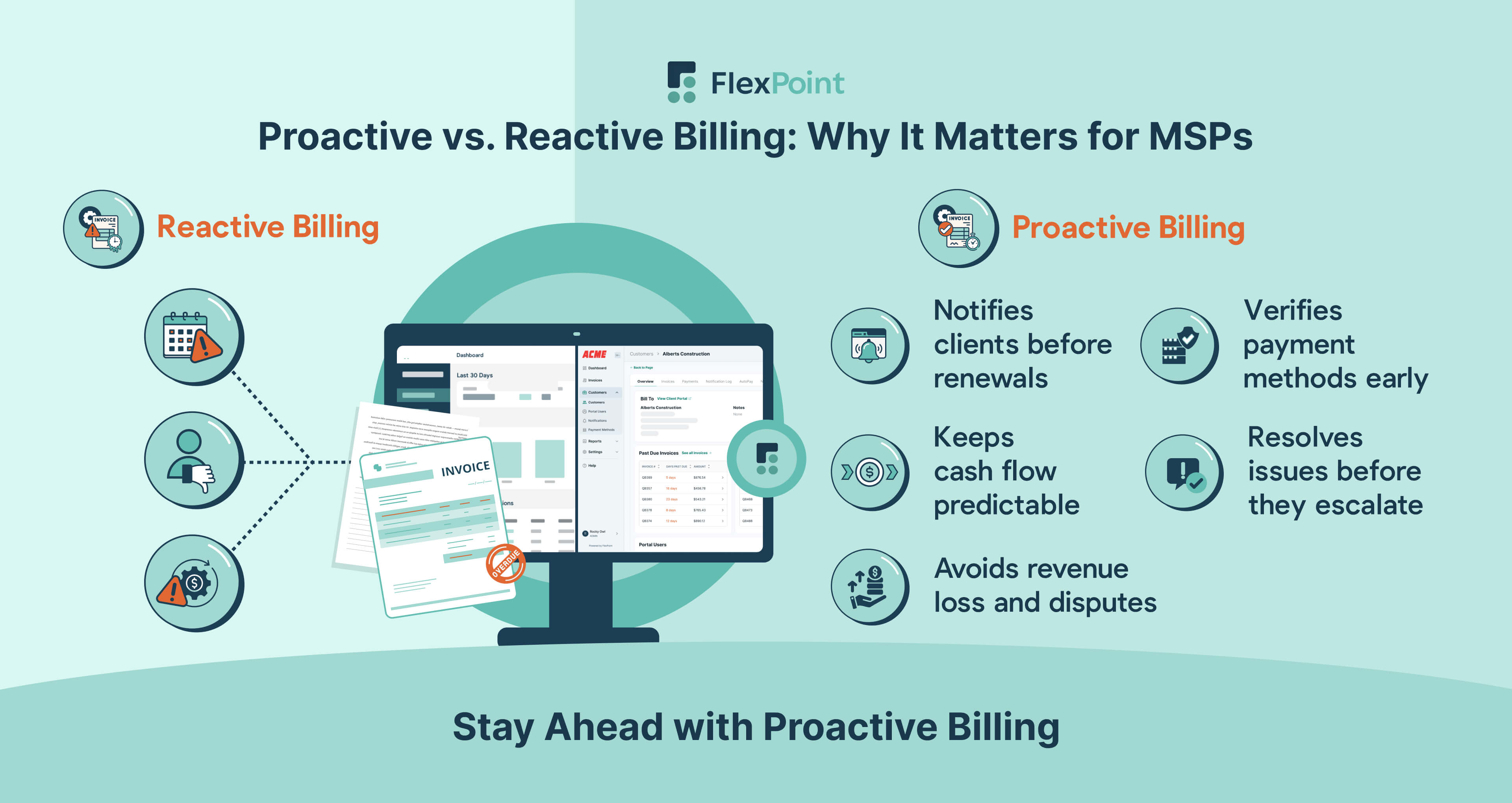
Proactive billing is a strategic approach where MSPs anticipate, plan, and implement billing processes in advance. This method enhances efficiency, reduces delays, and improves cash flow by addressing issues before they arise.
For example, an MSP using proactive billing:
- Notifies customers before subscription renewals
- Verifies payment methods early
- Resolves payment issues/challenges promptly to ensure smooth transactions
Reactive billing, on the other hand, is a passive approach where MSPs only address billing needs after problems occur. This often leads to:
- Payment delays and failed transactions
- Service disruptions and unhappy clients
- Unbilled work and revenue loss
- Poor communication, leading to conflicts
Essentially, reactive billing creates unstable revenue, making planning difficult. Proactive billing prevents these issues by staying ahead of potential problems.
With the right strategies, switching to proactive billing can avoid financial headaches. In the next section, we will analyze proven strategies and methods for making a successful transition to proactive billing.
{{ebook-cta}}
5 Strategies for Implementing Proactive MSP Billing
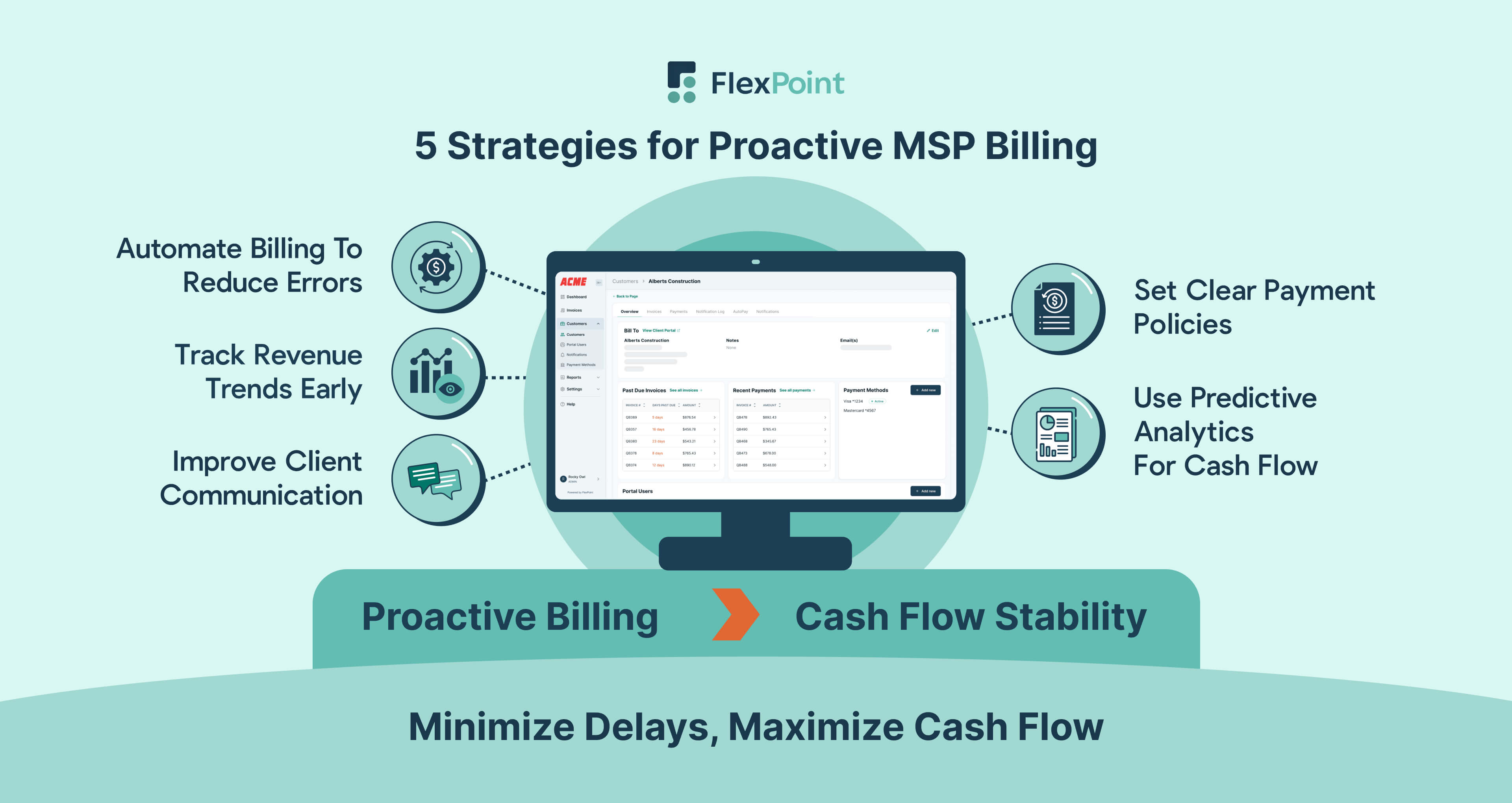
Late payments are a significant barrier to business growth. For MSPs, inefficient billing processes can disrupt cash flow, strain client relationships, and hinder financial planning.
By adopting proactive billing strategies, MSPs can minimize delays, improve revenue predictability, and reduce administrative burdens.
In this section, we’ll explore key methods to enhance billing efficiency and ensure long-term financial stability.
1. Automating Billing Processes to Reduce Delays and Errors
Manual invoicing processes inherently increase the likelihood of billing errors.
According to a study by the Institute of Finance and Management, 12.5% of manual invoices contain errors.
These errors range from incorrect billing amounts and missed charges to inaccurate client details and outdated information.
These billing errors directly lead to delays in revenue collection. According to OroCommerce, incorrect invoices cause over 60% of payment delays.
When clients receive inaccurate invoices, they are likely to question the charges. This leads to payment disputes and requires time-consuming follow-ups and corrections, and in the worst cases, may incentivize the client to churn.
However, automating billing processes significantly reduces the potential for human error. Doing so accurately pulls data from integrated PSA and accounting tools, ensuring that invoices reflect the correct information.
Furthermore, automation accelerates the entire billing cycle. Automated systems can generate and send invoices promptly after service delivery or at predetermined intervals.
This ensures timely client receipt and reduces the lag between service provision and payment request.
This speed and automated payment reminders encourage clients to pay on time, which reduces delays and improves cash flow.
2. Monitoring Revenue Trends for Early Financial Adjustments
According to MSP Insight, clients often delay or refuse payment if they feel the service lacks sufficient value.
Tracking revenue trends helps you identify financial problems early and make adjustments before they become serious.
You can predict cash flow issues, adjust pricing, and improve sales strategies by monitoring key metrics. These metrics include:
- Monthly Recurring Revenue (MRR): Shows if your steady income is growing or declining. A drop could mean losing clients or slowing new sales.
- Average Revenue Per User (ARPU): Tells how much you generate from a client annually. If it’s falling, clients may be downgrading, or your pricing may need review.
- Sales Pipeline: Fewer or smaller deals in progress? Future revenue might drop.
- Service Usage: Are clients shifting to cheaper services? This could lower future earnings.
- Late Payments: If clients take longer to pay, cash flow problems may arise.
- Seasonal Trends: Some months may naturally bring lower revenue plans.
Using these metrics, you can monitor revenue trends, spot financial risks early, and take action before problems grow.
For example, a drop in MRR and a weak sales pipeline signal future revenue declines, while falling ARPU and rising costs hurt profits.
Cash flow will suffer if Day Sales Outstanding (DSO) increases. DSO tracks how long your MSP takes to collect payments after a sale has been made.
Monitoring DSO helps you spot billing inefficiencies, improve cash flow, and maintain financial health.
Catching these red flags early allows you to adjust pricing, tighten payment terms, or secure backup funding to stay afloat.
Tracking trends can improve client retention and control expenses, ensuring long-term financial health and more intelligent business decisions.
This proactive approach prevents surprises and keeps cash flow steady.
3. Establishing Clear Payment Policies to Minimize Late Payments
Defining clear payment policies and communicating them upfront to clients is essential for MSPs.
It directly impacts financial stability, client relationships, and operational efficiency.
Research shows that including detailed payment instructions on invoices improves payment times for 70% of businesses.
When clients know exactly what’s expected, payments arrive on time, which minimizes delays and ensures stable revenue.
Even more so, having clear payment terms, including due dates and accepted payment methods, reduces misunderstandings and disputes.
Consistent policies ensure accurate records and smoother payment tracking, while predefined dispute processes resolve conflicts quickly, keeping operations running smoothly.
Here are proactive ways of setting due dates, enforcing late fees, and sending automated payment reminders:
Setting Due Dates:
- Standardize billing cycles (monthly or quarterly) and align due dates with service delivery dates.
- State due dates clearly (e.g., “Payment due June 30, 2024” instead of vague terms like “NET 30”).
- Discuss payment preferences during client onboarding and adjust terms where feasible.
- Offer flexible options (net 15, net 30, or custom plans) to improve client satisfaction and reduce delays.
Enforcing Late Fees:
- Set clear rules: Define late fees (either as a percentage or a flat charge) in contracts to keep them clear and visible.
- Communicate early: Explain penalties during onboarding and highlight them in invoices.
- Stay consistent: Apply fees fairly, but offer grace periods for first-time offenders or those facing hardship cases.
Automated Payment Reminders:
- Schedule alerts: Auto-send reminders before, on, and after due dates.
- Multi-channel nudges: Use email and client portals based on preference.
By diligently establishing clear payment policies and communicating them effectively, you can minimize late payments and improve cash flow stability.
4. Leveraging Predictive Analytics for Smarter Cash Flow Management
Studies show that 57% of MSPs plan to use AI to improve their operations by 30% by 2028.
AI-powered billing analytics involves processing historical and current data using statistical algorithms to forecast future trends in payment patterns.
This allows you to move beyond reactive measures for managing accounts receivable and adopt a forward-looking approach to financial management instead. It also helps you predict client payment behaviors by analyzing historical data, service usage, and seasonal trends.
Using this model, you can identify late payments, irregular spending, or financial strain, flagging high-risk clients before issues arise with them.
With these insights, MSPs can tailor invoicing strategies for better results.
For instance, reliable payers could be rewarded with early payment discounts or a simple thank you as an incentive to maintain their good track record.
Conversely, clients who frequently pay late face firmer policies, such as requiring upfront deposits or reducing the time allowed to settle invoices.
The result? More competent cash flow management and stronger client relationships.
Predictive analytics enables proactive adjustments from optimizing invoice timing to personalizing communication, reducing late payments, and improving financial stability.
By anticipating behaviors rather than reacting, you gain control over revenue cycles while maintaining positive client experiences.
5. Enhancing Client Communication to Prevent Billing Disputes
According to Versapay, eight of ten businesses lose revenue due to a lack of communication in the invoice-to-cash process.
Clients are far less likely to raise questions when informed about their charges and how they are calculated. But unexpected charges or unclear billing practices can quickly erode client trust and lead to disputes.
As OroCommerce highlights, incorrect invoices cause over 60% of payment delays, and a significant portion of disputes stem from billing inaccuracies or miscommunication.
Clear, consistent, and timely communication channels can significantly reduce misunderstandings and build trust.
For instance, providing clients access to self-service portals empowers them to independently review their invoices, track payments, and update payment details.
Any changes to service pricing, billing cycles, payment terms, or the introduction of surcharges must be communicated to clients well in advance.
This allows clients to prepare for these changes and ask questions, preventing surprises.
For example, when implementing a credit card surcharge, you must clearly explain the policy, the surcharge amount or percentage, and the reason for its implementation before it appears on an invoice.
This transparency and convenience can significantly reduce unwanted billing-related inquiries and disputes.
Conclusion: Strengthening MSP Financial Stability Through Proactive Billing
Proactive billing practices help MSPs avoid late payments, client disputes, and revenue leakage. This can be accomplished by automating invoicing, tracking financial trends, setting clear payment terms, and improving communication.
By leveraging technology such as predictive analytics and automated reminders, MSPs can improve cash flow, reduce errors, and promote long-term financial stability through stronger client relationships.
Additionally, implementing structured billing policies is crucial for establishing clear client expectations and ensuring consistent revenue streams.
This includes outlining clear payment terms, providing detailed invoices, defining billing cycles, and offering convenient payment options.
The FlexPoint billing solution is designed to help MSPs implement these proactive financial management strategies.
This centralized and intuitive platform automates invoicing. It generates detailed reports for analysis and enforces structured billing policies through features like automated reminders and client portals.
For example, Limetree Labs, an Idaho-based MSP, aimed to streamline its complex invoicing processes to enhance efficiency and bolster client trust.
Founder Bobby Lind realized that QuickBooks couldn't handle their complex invoicing securely, so they needed a solution to prevent financial and security risks.
After switching to FlexPoint, Limetree Labs gained a secure client portal for self-service payments and automated billing, saving time while reducing security risks.
The platform’s customizable features, like AutoPay and invoice reminders, allow tailored billing for each client while protecting sensitive data.
As a result,
- The streamlined invoicing workflow led to a 50% reduction in invoice processing times.
- It boosted overall operational efficiency by 30%.
- The client portal helps them retain clients, saving them millions of dollars.

Reduce late payments, enhance revenue predictability, and improve cash flow today.
Optimize your MSP’s financial operations with FlexPoint’s proactive billing solutions.
Schedule a demo to see how FlexPoint can transform your billing processes.
{{demo-cta}}
Additional FAQs: MSP Billing & Proactive Financial Management
{{faq-section}}


